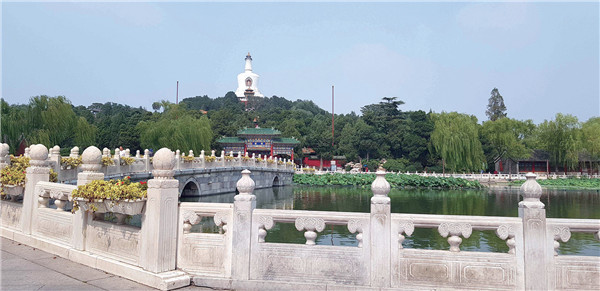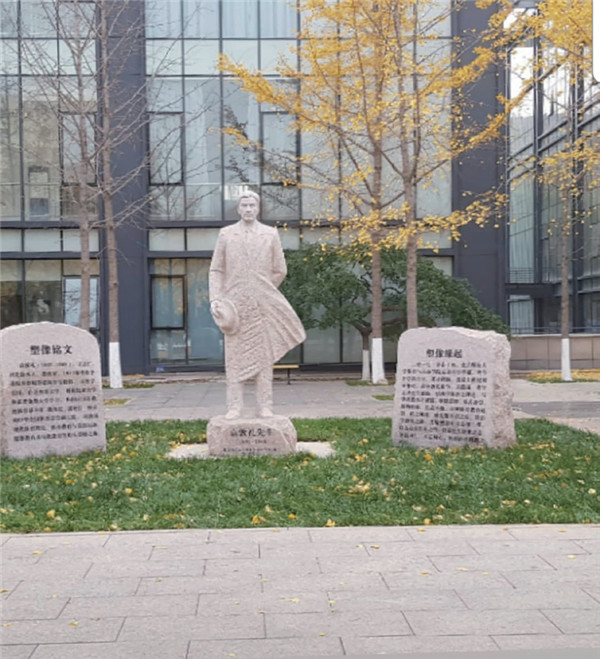中式戀愛
〔瑞士〕 莉娜 北京師範大學

從表面上看,中國人似乎與我們國家的人沒有什麼不同。但是當涉及人際交往和戀愛時,那就是我開始真正體驗一些文化差異的時候。作為一個有過和中國人談戀愛經歷的歐洲人,我當然體驗了很多所謂“文化震撼”。下面,我就給大家講幾個戀愛中的小故事,表達我感受到的中國文化對我的衝擊。
“外面冷了,你多穿點兒衣服。”我立即想到我當時的男朋友會跟我説的擔心我的這些小句子。例如:“外面很冷,注意保暖哦。”或者直接説:“乖喲。”與歐洲人談戀愛相比,這是一個很大的差異。我們絕不會告訴任何人“吃點東西”或“乖”或“多穿點兒衣服”。我想如果我的同胞這樣跟我説話,我會覺得他可能有點太霸道。我可能會想:“我是成年人,為什麼要告訴我這些顯而易見的事情呢?”我們十歲以後,甚至父母也不再説這些。但是在中國,這似乎是完全正常的,甚至是可以預期的。我也開始期待,甚至喜歡聽到這些話。畢竟,誰不想被照顧呢?

與同學在張家界 / 莉娜提供

北海公園 / 莉娜提供
“我養你喲!”對我來説,另一個非常有趣的觀點是在中國的戀愛關係中,男人似乎扮演著一種“保護角色”。比如,他在餐館付款,在財務上提供資金來養他的女友,甚至在某種程度上關心她的父母。我當時的男朋友第一次問我父母最近怎麼樣時,我感到有點驚訝。“他們過得還好吧。”我喃喃自語。我其實並不經常跟他們聯繫,我不知道該説什麼。然後他説:“耶誕節快到了,你快回家了。”他給了我一個大袋子,裏面裝滿了禮物,送給我的父母和整個家庭。“你為我全家人買了禮物嗎?”我充滿驚訝。“沒事,我養你喲,妞!”他微笑了。“這是送給咱媽的禮物。”“咱媽?什麼咱們的媽媽,她是我的媽媽呀。”我説。“你知道我們結婚之後,”他説,“我叫你的媽媽‘咱媽’。”“婚姻?”我們當時才談了一年的戀愛。“你打算結婚嗎?”他問。我開始流汗,欲言又止。他説:“哎,不用擔心,我爸媽已經買了房子。”“房子?!”我喊了出來。在我的國家,結婚是沒有前提的。沒有人需要房屋或汽車,父母通常不會催婚。在我們的生活中,婚姻不是一件必須在特定年齡或與特定人進行的事情。如果想結婚就結婚,如果從未想過結婚,那也可以。我認為這是一個很大的文化差異。我覺得中國人更注重家庭。在他們一生中的所有重要階段,家人都會向他們提供幫助和支援。儘管父母們有時可能會住在一個“空巢”的家,但他們的孩子最終還是會回來。

北海公園 / 莉娜提供
“你在幹嗎呢,你在幹嗎呢,你在幹什麼呢?”我注意到的另一個文化差異是發送短信的頻率。這應該也是因人而異,但總的來説,我想説的是,在我國,我們並不是經常發短信。但在中國,發短信的頻率高了一點。有一次我收到一條短信説:“你在幹嗎呢?”但是由於我很忙,所以沒有回復。兩分鐘後,我收到另一條短信,詢問我在做什麼。由於手機已靜音,因此沒看到。下課後我打開手機,一看到螢幕就很驚訝:我收到了五條短信和兩個未接來電。在我的國家,談戀愛不是我們生活的全部,而只是我們生活的一部分。我們通常會花一些時間,但是我們不會每天花很多時間一直考慮對象在做什麼。另一點是,我們從不希望被視為“黏人”的或者過度依賴他人的那種人。因此,我們絕不會發太多短信或者回復得太快。否則,對象會認為你沒有尊嚴。但是我不得不承認,我個人更喜歡中國人的方式,這樣的愛情真甜!

北京師範大學 / 莉娜攝
“不好意思,我們的星座不配。”這一點我覺得很有趣。有一次我在一家餐館遇到一個男生,我一坐下他就問我的星座是什麼。我有點困惑。那重要嗎?他跟我解釋他跟他的前女友分手的原因是,他的父母説他們的星座不匹配。那時候我就不知道我是應該為父母對孩子談戀愛的事情有發言權而感到驚訝,還是對星座如此重要而感到驚訝。但是我發現,在中國這並不是少見的現象,父母對子女談戀愛的事情有一定的發言權。我想中國每個家庭父母對子女戀愛的干涉程度和親子之間的親密程度都不同,但如果子女決定結婚,父母可能都會發表意見。特別是在結婚後,父母可能會幫忙照顧新生兒,甚至經常來新婚夫婦的房子打掃。所有這些在我的國家都非常罕見。父母通常不會干預子女的戀愛或婚姻生活,更不用説計算生日日期或星座的匹配度了。這些傳統和習慣讓我感到困惑,也讓我著迷。幸運的是,我不是四月四日出生的,否則可能沒有中國男人會想要我。
總而言之,在中國戀愛肯定會受到文化衝擊。我覺得作為人類,儘管有著相同的感受,但是在彼此相處中,我們還是會發現不同的表達方式。回顧過去,這些文化衝擊常常是引起笑聲的原因,甚至能使人際關係更加牢固。
Chinese-Style Love
〔Switzerland〕 Lina Kohler, Beijing Normal University
Apparently, the Chinese people seem to be not different from the people in our country. But when it comes to interpersonal relationship and love, that’s when I start to really experience some cultural differences. As a European who had love experiences in China, I have certainly had a lot of so-called cultural “shock”. Next, I will tell you a few love anecdotes to express the impact of Chinese culture on me.
“It’s cold outside, put on more clothes.” I immediately think of these small sentences that my boyfriend at that time would tell me in concern. For example, “It’s cold outside, keep yourself warm,” or just say, “Good girl.” Compared with Europeans in love, this is a big difference. We will never tell anyone to “eat”, “be good” or “put on more clothes”. I think if my countrymen speak to me like this, I would think he might be a little too bossy. The addressed may think, “I’m an adult, so why are you telling me these obvious things?” After 10 years old, even parents stop talking to their children about this. But in China, this seems to be completely normal, even predictable. I also begin to look forward to this and even like to hear these words. After all, who doesn’t want to be taken care of?
“I’ll support you!” Another very interesting idea to me is that men seem to almost play a “protective role” in Chinese lovers’ relationships. For example, he pays in restaurants, provides financial funds to support his girlfriend, and even cares about her parents to some extent. I was a little surprised when my boyfriend asked about my parents for the first time. “They’re all right.” I muttered to myself. Since I didn’t really get in touch with them often, I didn’t know what to say. Then he said, “Christmas is coming, and you’re soon going home.” He gave me a big bag full of gifts for my parents and the whole family. “Did you buy presents for my family?” I was surprised. “It’s all right, I’ll support you, girl!” He smiled. “This is a gift for our mother.” “Mother? What do you mean our mother? She is my mother.” I said. “You know, after we get married,” he said. “I’ll call your mother ‘our mother’” “Married?” We had only been in love for a year at that time. “Are you going to get married?” he asked. I began to sweat and hesitated to speak. He said, “Oh, don’t worry, my parents have already bought a house.” “House?!” I shouted. In my country, there is no prerequisite for marriage. No one needs a house or a car, and parents usually don’t urge their children to get married. In our life, marriage is not something that must be done at a particular age or with a particular person. If you want to get married, get married, and if you never think about getting married, that’s fine. I think this is a big cultural difference. I think Chinese people pay more attention to family. At all important stages of their life, their family will provide them with help and support. Although parents may sometimes live in an “empty nest”, their children will come back eventually.
“What are you doing? What are you doing? What are you doing at all?” Another cultural difference I have noticed is the frequency of sending text messages. This should vary from person to person, but generally speaking, what I want to say is that we don’t often send text messages in our country. But in China, the frequency of texting is a little high. Once I got a message saying, “What are you doing?” I didn’t reply because I was very busy. Two minutes later, I received another text message asking what I was doing. Because the mobile phone had been muted, I didn’t see it. After class, I turned on my phone and was surprised to see on the screen: I received five text messages and two missed calls. In my country, love is not the whole of our life, but only a part. We usually spend some time, but definitely not a lot of time every day thinking about what our lover is doing. Another point is that we never want to be seen as “clingy” or over-dependent on someone. Therefore, we will never send too many text messages or reply very soon. Otherwise, your lover would think that you have no dignity. But I have to admit I personally prefer the Chinese way, for such love is really sweet!
“Sorry, our constellations don’t match.” I think this point is very interesting. Once I met a boy in a restaurant. As soon as I sat down, he asked me what my zodiac sign was. I was a little confused. Does it matter? He explained to me that the reason he broke up with his ex-girlfriend was that his parents said their zodiac signs didn’t match. At that time, I didn’t know whether I was surprised that parents had a say in their children’s relationships, or that zodiac signs were so important. But I have found that it is not an uncommon phenomenon in China that parents have a certain say in their children’s love affairs. I think parents in China differ in the degrees of interference with their children’s love and the degree of intimacy with their children. But if their children decide to get married, all parents may express their opinions. Especially after marriage, parents may help take care of the newborn and even often come to clean the house of the newlyweds. All of these are very rare in my country. Parents usually do not interfere with their children’s love or marriage life, let alone calculate the matchableness of dates of birthday or zodiac signs. These traditions and habits confuse me and fascinate me as well. Fortunately, I was not born on April 4, otherwise maybe no Chinese man would want me.
All in all, having a love affair in China is bound to be affected by culture shock. I think as human beings, although we have the same feelings, we still find different ways of expression when we get along with each other. In retrospect, these culture shocks are often causes of laughter, and perhaps they even make interpersonal relationships stronger.



